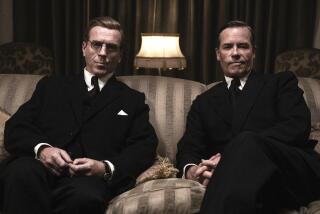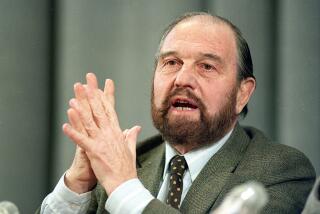‘The Third Man’ Didn’t Earn a Simple Passing
- Share via
H.A.R. (Kim) Philby is dead. Or is he? Has he been for some time?
In the wilderness of mirrors that constitutes what spy-watchers call the “second oldest profession,” Philby was always another reflection of his real self. His life was continuous deception. Is his death?
As a blue-blooded English undergraduate, recruited into the “Cambridge Comintern” of potential Soviet moles in 1933, Philby joined a Nazi organization--the Anglo-German Fellowship--to disguise his true role as a Soviet agent. In Spain he wrote dispatches from the front for Franco, not the Republicans. In World War II he rose through the ranks of British intelligence to become head of Section 9 of MI-6 (Secret Intelligence Service), in charge of British counterintelligence operations against the Soviet Union. In reality he was a Soviet agent.
During the war, Philby could claim some consistency as a double agent, serving both Churchill and Stalin in the struggle against Hitler by passing British information to a Soviet ally.
The Cold War changed all that. Philby became Stalin’s most important agent in the West, guaranteeing the failure of Anglo-American plans to penetrate Albania in 1949, arranging the murder of another Soviet agent who threatened to betray him, systematically sending Western agents to their deaths and serving as British liaison between the fledgling Central Intelligence Agency in Washington from 1949 to 1951.
A charming stutterer and hard-drinking socialite, he drew little suspicion in the clubby world of post-war intelligence.
Philby’s first death came in 1951, when J. Edgar Hoover and the British first suspected him as the “Third Man” in connection with the defection of two other Soviet agents, Guy Burgess and Donald Maclean, to Moscow.
A blown agent is a dead agent. In 1963 Philby disappeared in Beirut, presumed dead, then turned up resurrected in Moscow, where for 25 years he lived on a Soviet pension in well-deserved obscurity. Two deaths.
We will never know precisely what Philby told the Soviets. More important were the seeds of mistrust he planted between American and British intelligence. No British official would henceforth enjoy the trust of the “special relationship.” Obsessive official secrecy weakened security and protected the traitors of the British establishment from prying eyes. After 1951, Americans would never again share secret information of any magnitude with that establishment.
In a century of collectivism, Philby’s life was a triumph of amoral self over loyalty to others--his family, his class, his country. His epitaph should read (in Russian): “A traitor to others, a stranger to all, a resident nowhere.”
In truth, this man died many times in many places with acts of betrayal we can never know.
More to Read
Sign up for Essential California
The most important California stories and recommendations in your inbox every morning.
You may occasionally receive promotional content from the Los Angeles Times.








